Each academic year, the Center engages students and faculty across departments and disciplines through the curation, administration, and production of public-facing programs. Programming is governed by the Center’s three initiatives, which the BUCH Expanded Charter developed in 2022/2023 to focus the Center’s efforts in maintaining and enlarging its current programmatic scope.
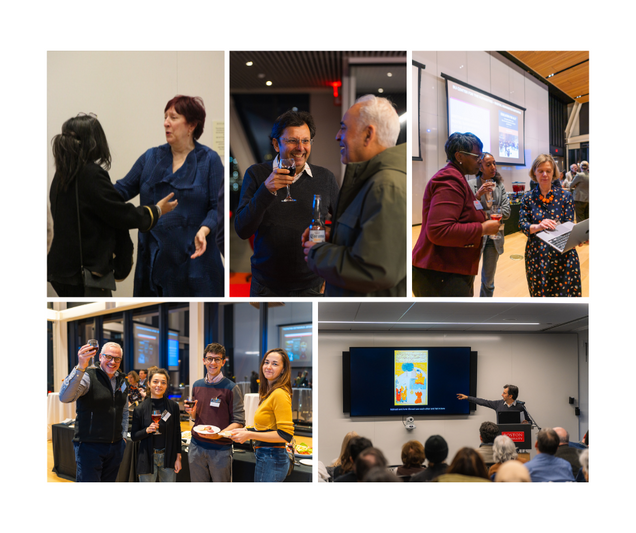
Beyond the Binge
Human Choice and the Ethics of Algorithms in Education and Entertainment
The pervasive influence of algorithms on our entertainment and educational consumption is undeniable, serving at times to increasingly blur and draw novel lines between them. “Beyond the Binge” will grapple with complex questions regarding futures of education and entertainment that will inevitably be shaped by AI. Fostering a critical dialogue among computer scientists, media theorists, philosophers, humanists and historians, the aim of this two-day conference is to generate actionable recommendations for a more ethical and equitable future. The first day of the conference will focus on entertainment and algorithms, the second will focus on the future of humanistic education and research. Visit the Beyond the Binge webpage.
Mathematics with a Human Face
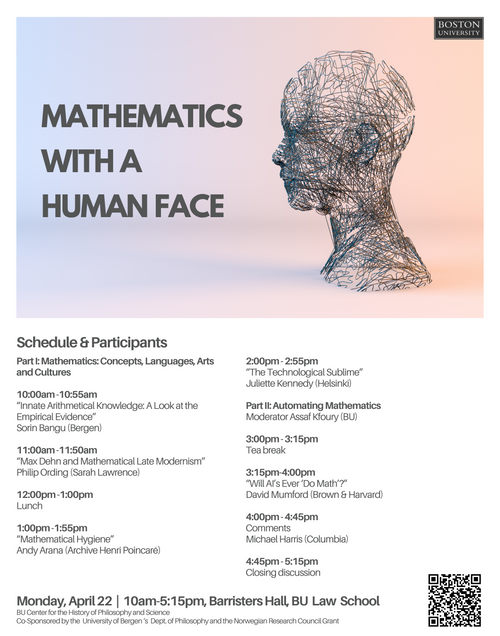 Mathematicians and philosophers gathered in BU’s law building on April 22, 2024, for the inaugural “Mathematics with a Human Face” conference, sponsored by the Center in collaboration with the University of Bergen’s Department of Philosophy and the Norwegian Research Council. The event drew seven speakers from around the world to discuss the role of creativity and the human element in mathematics and the age of AI. Center Director Juliet Floyd, known for her work in the philosophy of logic and mathematics, welcomed attendees, who enjoyed a day full of conversation. Watch the recording
Mathematicians and philosophers gathered in BU’s law building on April 22, 2024, for the inaugural “Mathematics with a Human Face” conference, sponsored by the Center in collaboration with the University of Bergen’s Department of Philosophy and the Norwegian Research Council. The event drew seven speakers from around the world to discuss the role of creativity and the human element in mathematics and the age of AI. Center Director Juliet Floyd, known for her work in the philosophy of logic and mathematics, welcomed attendees, who enjoyed a day full of conversation. Watch the recording
Building Bridges: Connecting the Humanities and Technology
On Thursday, November 9, 2023, the Center welcomed over thirty faculty members, administrators, graduate students, and undergraduates to Building Bridges: Connecting the Humanities and Technology, a “meet and greet” event that officially launched the Center’s Digital Humanities Initiative DHI. Attendees represented many departments and programs as well as schools and colleges. The crowd enjoyed lively conversation over refreshments and took full advantage of the opportunity to make connections with other members of the BU community who share an interest in digital humanities. Learn more.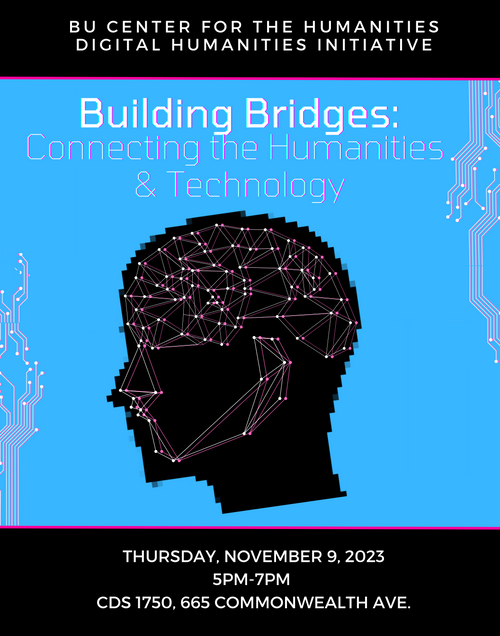
Lectures in Criticism
For nearly forty years, the Lectures in Criticism series has brought renowned scholars in the humanities to Boston University. It has run since 1983, hosting four external speakers every year in addition to one member of the BU faculty. Lectures in Criticism is dedicated to continuing this legacy of excellence with lectures every year in Fall and Spring. Learn more.
View Events Archive
Humanities in the World: Alumni Career Panel, 2021
在
Panelists
Philip Carey (CGS’92, CAS’94 – Classical Civilization)
Co-founder and Chief Executive Officer, Lion Capital Advisors LLC
Jay Fielden (CAS’92 – English)
Editor and Writer, Former Editor-in-Chief, Esquire
Christine Fletcher (CAS’91 – French Language & Literature)
Partner, Burns & Levinson LLP
Josh London (CAS’94 – English)
Chief Marketing Officer, Reuters and MD, Reuters Professional at Thomson Reuters
John “Jack” J. Lynch, Jr. (CAS’82 – English)
President, Chief Executive Officer and Director, Houghton Mifflin Harcourt
#UsToo: feminist artists intersect with #MeToo, 2020
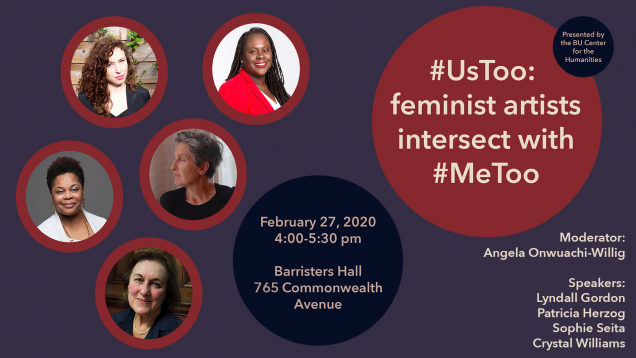
Content warning: mentions of racial and sexual violence.
In early February, the Center brought together a multi-generational, diverse group of feminists representing a variety of artistic disciplines and professions. The goal was to discuss inclusive feminism today. The panel included biographer Lyndall Gordon, philosopher and librettist Patricia Herzog, BU English professor and performance artist Sophie Seita, and poet and BU Associate Provost for Diversity & Inclusion Crystal Williams. As Angela Onwuachi-Willig, the panel’s moderator and dean of BU’s law school, said in her summary response, the participants addressed the ways in which feminism and its subjects are visible and invisible.
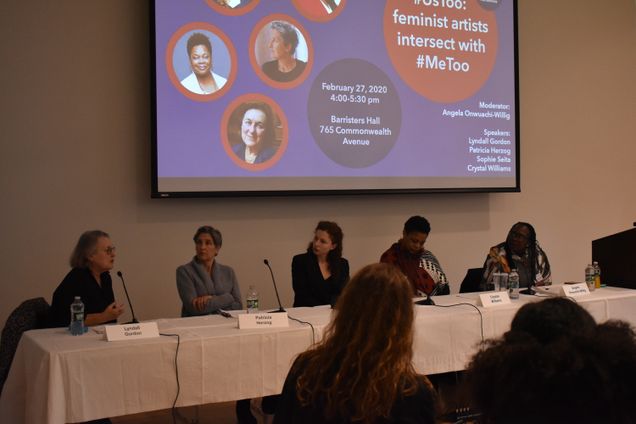
Lyndall Gordon spoke about female intellectuals Mary Wollstonecraft, Mary Shelley, and Virginia Woolf and their feminist predecessors. Gordon noted that these accomplished writers were motherless, and thus lacked women role models. Instead, they “read one another, in a chain of making –– a new genus of womanhood across generations.” As Gordon also pointed out, because women are excluded from male intellectual communities, they have the opportunity to reject the violent norms of patriarchal society and pursue their own moral values.
Where Gordon’s talk showed how women’s exclusion from patriarchy afforded opportunities for social and intellectual innovation, Patricia Herzog’s talk investigated how women are portrayed in an operatic canon marked by misogyny and violence. Herzog began her talk with a nod to the Freudian concept of culture as “the work of reclaiming.” For Herzog, the retelling of canonical stories is a way of recuperating suppressed elements in classics. In her artistic work, Herzog reconceives well-known operas such as Puccini’s Madame Butterfly and Tosca, or rewrites literary works such as The Scarlet Letter as opera to re-present women characters as agents. In a striking, even paradoxical acknowledgment of tradition, Herzog noted that “certainly I am no Puccini, but I do hear voices. And the gloriously sung voices of Puccini’s heroines are what inspired me to take up this project.”
Sophie Seita offered an overview of her work as a feminist performance artist and scholar. Seita’s interest in experimental poetry and performance unifies her academic and artistic work. She notes that much of her scholarship explores the intellectual and cultural legacy of the Enlightenment––a period dominated by white male thinkers. For her project “My Little Enlightenment Plays,” Seita engages with Enlightenment writers, scientists, and artists from an explicitly queer feminist perspective, inviting queer and feminist artists to collaborate with her. Her goal is to stage a “creative form of reading that thinks through and alongside my source materials” in order to “create a more diverse and inclusive republic of letters.”
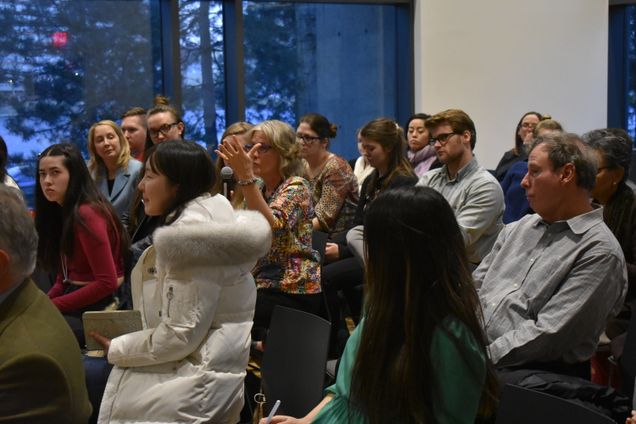
The last speaker, Crystal Williams, chose to feature black feminist poets whose work she turned to when asked to think about what it means to be a feminist artist in the age of #MeToo. She noted that the poems she selected had been “instructive to [her] as a developing artist and developing thinker.” Williams read “A Poem About My Rights” by June Jordan and also Lucille Clifton’s “won’t you celebrate with me.” June Jordan’s poem portrays the intertwining of sexual violence with colonial, economic, and racial violence, as confirmed by her eloquent declaration:
I am the history of rape
I am the history of the rejection of who I am
I am the history of the terrorized incarceration of
myself
I am the history of battery assault and limitless
armies against whatever I want to do with my mind
and my body and my soul . . .
At the conclusion of these diverse presentations, moderator Angela Onwuachi-Willig deftly identified their continuities. For instance, Onwuachi-Willig showed how each speaker carefully negotiated the relationship between silence and being compelled to speak. And each addressed how women find their voices as artists while contending with historical pressures that keep women silent.
Forum 2019, Can We Talk ? Dialogue and Debate in the Contemporary Academy
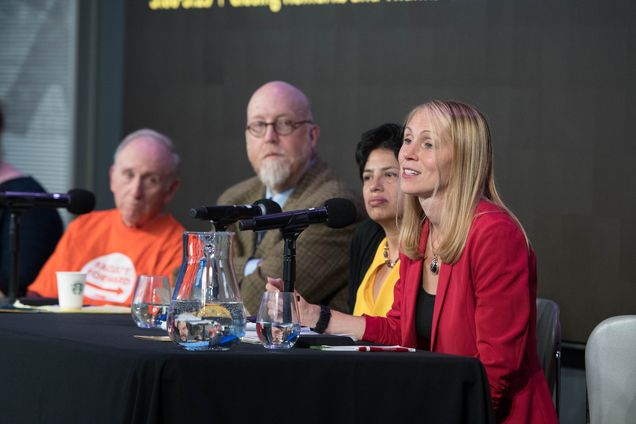
Dialogue and Debate in the Contemporary Academy, explored one of the biggest challenges facing universities today: the question of how to promote honest intellectual exchange. In fall 2020, we plan to continue the work begun in Forum 2019 through three working groups of undergraduates, graduate students, and faculty and staff.
Incarceration Film Series, November 2019
 As part of the Center’s efforts to program events on topics of importance to the BU community, we launched a film series on the subject of incarceration, and in November 2019, we hosted our inaugural screening, with co-sponsorship from the Kilachand Honors College, the African American Studies Program, and the American Studies Program.
As part of the Center’s efforts to program events on topics of importance to the BU community, we launched a film series on the subject of incarceration, and in November 2019, we hosted our inaugural screening, with co-sponsorship from the Kilachand Honors College, the African American Studies Program, and the American Studies Program.
Hannah Kinney-Kobre, the senior undergraduate staff assistant at the Center, and Christine D’Auria, the Center’s 2019/2020 graduate student intern conceived the event, in a rare collaboration between graduate and undergraduate students that we hope to have more of in the future. D’Auria and Kinney-Kobre decided the best way to allow members of the BU community to critically engage with the experiences of people in prison was to show films made by incarcerated people. The two films screened in November, Brett Story’s The Prison in Twelve Landscapes and the animated short film Freedom/Time, represent the effects of incarceration on families, friends, and communities, demonstrating how prison affects relationships and the lives of everyone in society.
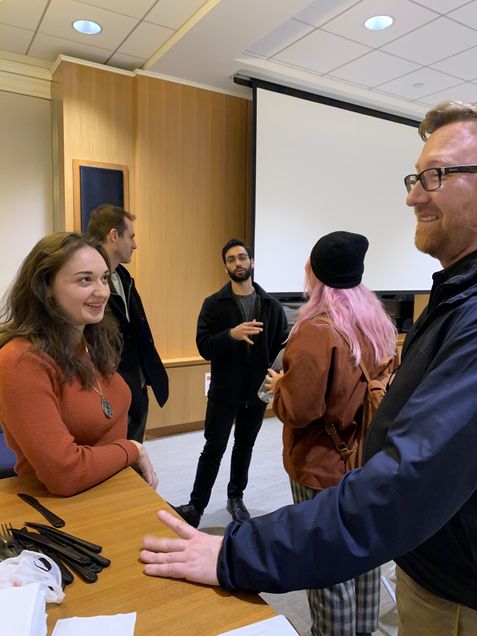
Kinney-Kobre introduced the two films at the event and provided background on Story’s film: “We see playgrounds, bus stops, parks, radio stations, offices––as well as idyllic Appalachian vistas, skies streaked with smoke and flames from raging forest fires, and softly flickering footage of tanks rolling down the highway. The prison as both an idea and a system is, in Story’s view, stitched into our very lives. Though it is often invisible to us, our economy, our sense of safety and community, and our relationships with each other are fundamentally tied up with incarceration. We see this even in our own community. BU Students Against Mass Incarceration has found that through the use of large investment funds (ETFs), BU, like many other universities, invests in private prisons. But BU also has a long-standing prison education program, one of the oldest in the country.”
The audience lingered after the screenings to talk informally about issues sparked by the films. Even though the second event in the series had to be cancelled because of COVID-19, the Center plans to continue screening films in AY 20/21 to expand the community’s engagement with incarceration, which has become a subject of heightened concern in the COVID-19 era.
BU Journals, February 2019
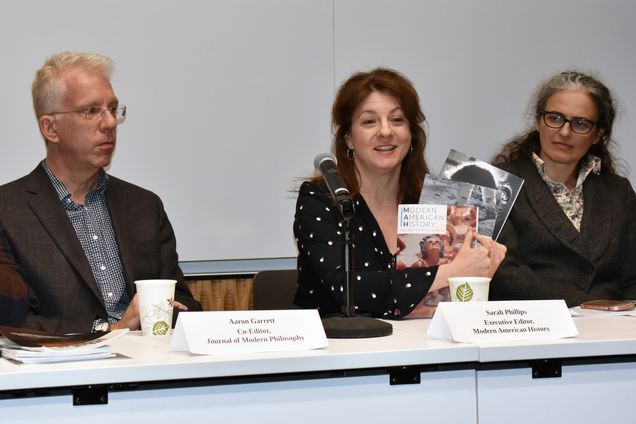
On February 5, 2019, the Center cosponsored with the Office of the Associate Dean of Faculty/Humanities, “A Celebration of Boston University Humanities Journals.” The event featured a panel of editors representing six celebrated humanities journals, all of which are associated with BU.
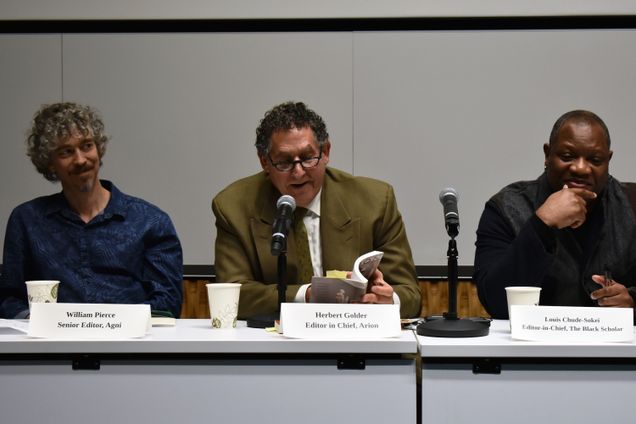
The journals featured were AGNI, Arion, The Black Scholar, The Journal of Modern Philosophy, Modern American History, and Studies in Romanticism. In addition to highlighting the unique perspectives the journals provide in the context of their fields, the editors discussed the shifting media landscape and its impact on academic publishing. They also discussed the methodological and disciplinary flexibility that their journals strive to encourage. The event concluded with a moving, memorable reading of Horace by esteemed poet David Ferry, whose own work has been published in Arion for many years.
Forum 2018, Humanities Approaches to the Opioid Crisis
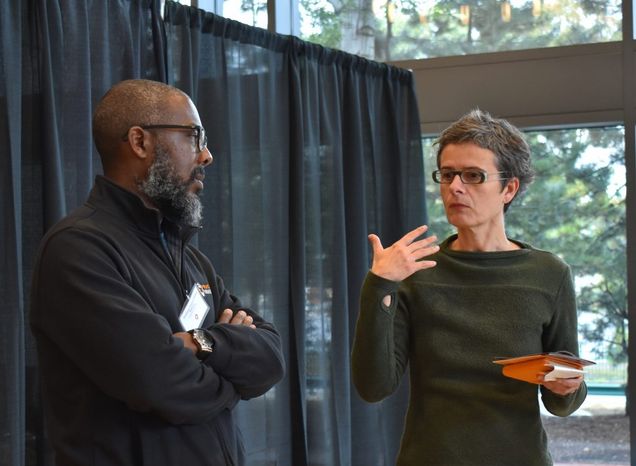
Partnering with area schools of public health and medicine, and representatives of city, state, and federal government, this forum demonstrated how humanities disciplines provide languages that address social and health problems. The goal was to initiate local, national, and global conversations with experts at both academic and non-academic institutions on the opioid crisis.
Ex-Libris Screening, 2018
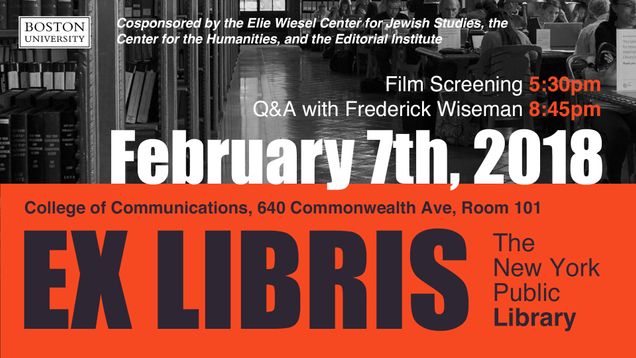
On February 7, 2018, renowned documentarian Frederick Wiseman visited BU for a screening of his award-winning 2017 documentary, Ex-Libris, about the New York Public Library system, and how it contributes to the lives of New Yorkers from all backgrounds and walks of life. Through the film’s stunning portrait of the social center that the contemporary urban library has become, Wiseman’s work provides the human dimension for the ideas and theories of the October 2017 “Recording Lives” forum, showing how libraries and archives function on a daily basis. While Wiseman is notoriously reticent about his filmmaking methods, he provided some jewels of insight for the students, faculty, and community members in attendance. “When filming, you come across absolutely extraordinary things which you don’t invent and you’re lucky enough to be present when they occur, and recognize how to use them,” he noted, adding that every film is the product of extensive editing and orchestration of materials.
Report from the Archives, 2018
 On February 6, 2018, the Center hosted “Report from the Archives,” a round table discussion of archival work, featuring speakers from The HistoryMakers®, the Howard Gotlieb Archival Research Center and BU faculty, including Dick Lehr, Professor of Journalism, Walter Fluker, Martin Luther King Jr. Professor of Ethical Leadership, and Christine D’Auria, PhD student in American Studies. Louis Chude-Sokei, Director of the African American Studies Program, moderated.
On February 6, 2018, the Center hosted “Report from the Archives,” a round table discussion of archival work, featuring speakers from The HistoryMakers®, the Howard Gotlieb Archival Research Center and BU faculty, including Dick Lehr, Professor of Journalism, Walter Fluker, Martin Luther King Jr. Professor of Ethical Leadership, and Christine D’Auria, PhD student in American Studies. Louis Chude-Sokei, Director of the African American Studies Program, moderated.
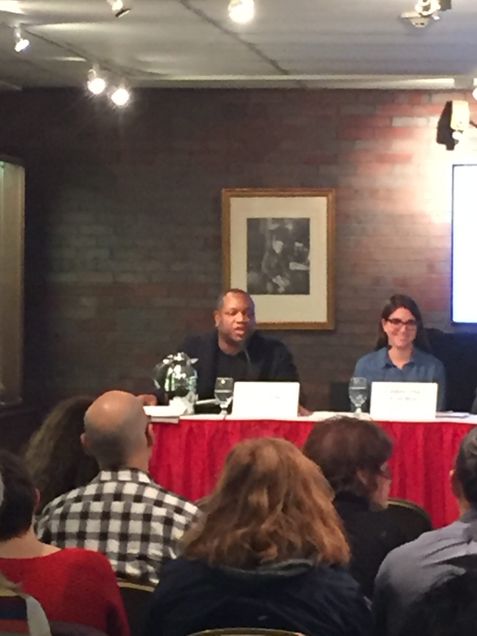
Developing ideas from the October 2017 forum, “Recording Lives,” panelists highlighted the relationship between technology and archives, and discussed how archival collections serve to prevent marginalized cultures from being erased. During the Q&A that followed, panelists and audience members contemplated the varied purposes of the archive—as a place of law and authority as well as a source of wonderment.
Forum 2017, Recording Lives: Libraries and Archives in the Digital Age
In this forum, the Center reached beyond its academic borders to highlight what humanities fields have to offer a broader public.
Partnering with the Boston Public Library and the Boston Athenæum, the forum featured panelists from the Athenæum, the Congressional Library & Archives, the Handel and Haydn Society, Historic Newton, Mount Auburn Cemetery, and the Mellon Sawyer Seminars at BU, to discuss how local cultural and academic organizations are deploying digital technologies to provide or expand access to their collections and engage more diverse audiences. The Center published a book collection of essays from the 2017 forum, edited by former Director Susan Mizruchi, in 2020.